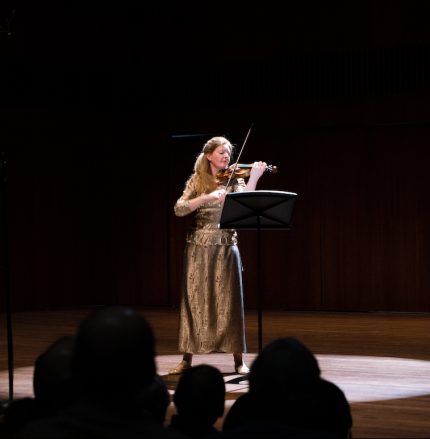Bach specialist Podger: Impeccable playing, debatable picks

British Baroque violin virtuoso Rachel Podger made her Chicago debut Friday night at the Logan Center. The one-woman recital was part of UChicago Presents’ Early Music Series, and was devoted mostly to the music of J. S. Bach. Podger ably demonstrated why she is an eminence in her field, some dubious choices in transcription notwithstanding.
The first half comprised Podger’s own transcriptions of two Bach Cello Suites: No. 1 in G Major and No. 3 in C Major. The first question one might have is whether these timeless works can be played on the violin, and this Podger emphatically answered in the affirmative. Her playing was thoughtfully inflected, broadcasting an aficionado’s seasoned understanding with this repertoire. In her remarks between the two works Podger described thinking of the Suites’ Preludes almost as improvisations, and her renditions of these conveyed had the sense of organically following a musical idea where it leads.
The second question one might have is whether Bach’s Cello Suites should be played on the violin, and the answer to this is more ambiguous. While Podger pointed out in her notes that Bach endlessly recycled his own works, this does not necessarily amount to a case for continuing to do so, and her performance did not entirely convince. To perform the Cello Suites, Podger transposes them up an octave and an additional fifth, changing their key. Much of the meditative “depth” — sonic and emotional — that characterizes the Cello Suites is lost at the higher tessitura.
Podger also remarked — correctly — that making the Cello Suites sound idiomatic on the violin necessitates faster tempos. This technical necessity is even greater on her less resonant period instrument. Ultimately these accommodations made the faster dances sound either glib or frantic, compromising the reflective aura one expects. (The performances clocked in several minutes below the standard durations on cello.) As for untold others, this music is clearly a joy for her to play, and that enthusiasm was palpable Friday night, but the listening experience unfortunately did not match.
The second half was devoted to works originally written for the violin, and unsurprisingly was vastly more effective. The one non-Bach item of the evening was the Passacaglia in G Minor, “Guardian Angel,” of Heinrich Ignaz Franz von Biber (1644-1704). This ten-minute fantasy over a ground bass was clearly a precursor to the Bach D Minor Chaconne, and one heard this connection in Podger’s rendition. She deftly dispatched the increasingly intense filigree over the four-note descending bass, which felt like an omnipresent force, in line with the work’s sobriquet (which derives from an illumination on the original manuscript).
The evening closed with Bach’s mammoth Violin Partita No. 2 in D Minor, and Podger was at her best in the early going here. She adroitly charted the harmonic wanderings of the Allemande, and put across the martial character of the Courante. Some false notes began to creep into the Sarabande, but Podger’s voicing of the polyphonic texture was sensitive and refined, and the Gigue felt fleet and airborne.
The famous Chaconne suffered in some of the same ways as the Cello Suites. Podger elected a brisk walking tempo, again perhaps a technical necessity on a Baroque instrument, but one that elided the harmonic intensity intrinsic to this music. The underlying melodic line was often lost, and there was rarely any sense of the requisite inexorability and gravitas. Even with these qualms about her stylistic choices, Podger undeniably charted Bach’s sprawling canvas with poise.
As an encore Podger offered the Andante from the Violin Sonata No. 2 in A Minor. This “heartbeat” movement had a sense of repose after the agitation of the Chaconne, and despite some pitchy moments, ended the evening on a note of solace.
UChicago Presents hosts an all-Beethoven program with the Danish String Quartet Friday, January 31, at 7:30 p.m. at Mandel Hall. chicagopresents.uchicago.edu/; 773-702-2787.
Posted in Performances


Posted Jan 26, 2020 at 7:34 am by Riccardo
Finally! Can’t agree more. Besides, I was wondering if there was any pause in the pentagram that night because there was none played. Almost felt I was in an Irish pub for most of the time.
The microphone placed right in front of the player obstructing the view made me even more disconnected with the music.